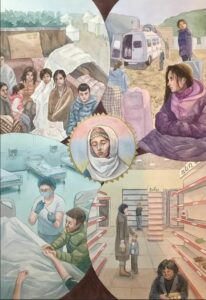By Zarmine Kalayjian-Boghosian
At Fordham University, on the occasion of the observance of the Armenian Genocide, the following were among the speakers: Dennis Papazian, Roger Smith and Ann Sortsman coordinated by psychologist Dr. Ani Kalayjian. Each is well known in their respective fields of studies.
On the same day, three high school students received awards and monetary gifts for an essay contest on the subject of the Armenian Genocide.
The absence of the Armenian youth and students in the audience was noticeable; instead, the chairs were filled by the Turkish and Azeri Turk students from the nearby universities of New York who had, it seemed, spread themselves in the audience. After an exhausting presentation with historical data and explanation by Prof. Papazian, these students kept parroting their leaders by demanding proofs of the Genocide.
Patiently, the lecturers provided the necessary explanations providing appropriate sources and references with the listing of names and authors. At the end I approached one of the questioning students who had volunteered that he attended Columbia University. I asked in a friendly fashion:









